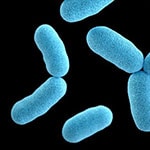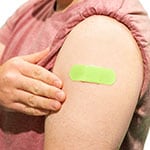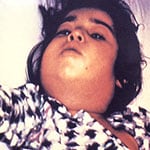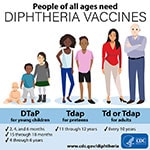Diagnosis, Treatment, and Complications
Diphtheria can infect the respiratory tract (parts of the body involved in breathing) and skin. Diagnosis and treatment depend on the type of diphtheria someone has. If a doctor thinks you have respiratory diphtheria, they will have you start treatment right away.
Diagnosis
Doctors usually decide if a person has diphtheria by looking for common signs and symptoms. They can swab the back of the throat or nose and test it for the bacteria that cause diphtheria. A doctor can also take a sample from an open sore or ulcer and try and grow the bacteria. If the bacteria grow and make the diphtheria toxin, the doctor can be sure a patient has diphtheria. However, it takes time to grow the bacteria, so it is important to start treatment right away if a doctor suspects respiratory diphtheria.
Treatment
Diphtheria treatment involves:
- Using diphtheria antitoxin to stop the bacteria toxin from damaging the body. This treatment is very important for respiratory diphtheria infections, but it is rarely used for diphtheria skin infections.
- Using antibiotics to kill and get rid of the bacteria. This is important for diphtheria infections in the respiratory system and on the skin and other parts of the body (e.g., eyes, blood).
People with diphtheria are usually no longer able to infect others 48 hours after they begin taking antibiotics. However, it is important to finish taking the full course of antibiotics to make sure the bacteria are completely removed from the body. After the patient finishes the full treatment, the doctor will run tests to make sure the bacteria are not in the patient’s body anymore.
Complications
Complications from respiratory diphtheria may include:
- Airway blockage
- Myocarditis (damage to the heart muscle)
- Polyneuropathy (nerve damage)
- Kidney failure
For some people, respiratory diphtheria can lead to death. Even with treatment, about 1 in 10 patients with respiratory diphtheria die. Without treatment, up to half of patients can die from the disease.



